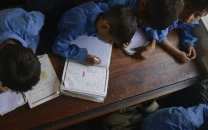PM wants least impact of taxes on poor
Premier told Pakistan contributing less than 1% in global emission

Prime Minister Imran Khan on Monday advised his economic team to pay special attention on reducing the burden of direct taxes on the poor segments of the society.
The premier also sought recommendations on lessening the taxes on imported edible items to provide relief to people especially the middle class and the underprivileged.
PM Imran chaired meeting of his economic team which reviewed the possible steps for bringing down the prices of basic commodities and providing relief to the common man.
The meeting also exchanged views on giving targeted subsidy to the deserving families under the Ehsaas programme.
The premier reiterated his stance that the first priority of the incumbent government was the benefit of the common man. He noted that due to the difficult economic situation the vulnerable segments of the society was the most-affected.
He directed his economic team to focus on lessening the impact of direct taxes on the poor segments of the society.
Separately, chairing a meeting on climate change, the premier was told that Pakistan's emission growth had gone below 9% below business-as-usual baseline and also under the Nationally Determined Contributions.
The participants of the meeting maintained that this climate-friendly shift had been made possible following the increased forest cover due to successful Billion Tree Tsunami project in Khyber Pakhtunkhwa and the ongoing 10 Billion Tree Tsunami Programme across the country.
Special Assistant to the Prime Minister (SAPM) on Climate Change Malik Amin Aslam observed that the deforestation rate had significantly reduced from 12,000 hectares per year to 8,000 hectares per year and would further fall with the success of tsunami tree project.
The meeting was informed that Pakistan was contributing less than 1% in global emission and that the overall ranking of the country vis-à-vis total emissions had shifted from 135 in 2015 to 133 in 2018 on per capita ranking.
Highlighting other successes, the SAPM stated that that Pakistan had increased its mangrove cover by 300% during 1990-2020 which is a strong carbon sequestering tool. The meeting was told that it is the largest mangrove cover increase in the world.
The participants were apprised that the country ranked 8th in terms of vulnerability to climate change and was faced with threats of rain variability, urban flooding, increased temperature and formation of glacial lakes.
It was further said that Pakistan is set to achieve first billion tree target by the mid of current year, which will be celebrated across the country.
The meeting was informed that 80,000 jobs were offered during the coronavirus pandemic under 10 Billion Tsunami Tree project.
The premier said that the billion tree tsunami programme should also be monitored through the satellite.
Underscoring the importance of early warning system to mitigate the impact of erratic climate change, the premier stressed on the need for water treatment plants to purify contaminated surface water of the rivers.
PM Imran also chaired a meeting of the National Coordination Committee on Tourism on Monday.
Taking note of the increasing domestic tourism, the prime minister emphasised that planning and feasibility on scientific grounds is essential before development of tourist sites in the country.
He was briefed about the feasibility conducted for development of new tourist sites in Punjab, Khyber Pakhtunkhwa and Balochistan.
The premier observed that Pakistan had a great potential for tourism which could be capitalised for revenue generation, employment and promoting heritage.
On the anti-encroachment drive, PM Imran directed that it should continue without any discrimination as there was no one above the law.



















COMMENTS
Comments are moderated and generally will be posted if they are on-topic and not abusive.
For more information, please see our Comments FAQ